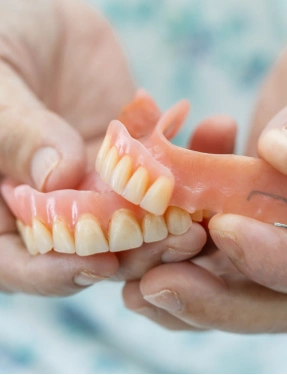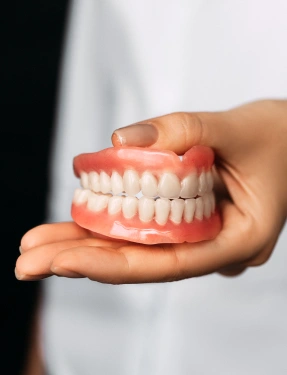Removable Partial or Full Dentures
What Are Dentures?
- Restoring your ability to talk and chew properly
- Enhancing your appearance and smile
- Increasing your self-esteem and confidence
Wearing dentures also helps to support the facial muscles and prevent sunken-in cheeks that can occur with tooth loss. Dentures may even promote your overall health by making it easier to eat a nutritious diet.
There are two types of removable dentures: partial and full. Partial dentures fill in the gaps left by one or multiple missing teeth, while full dentures replace all the teeth in your upper or lower jaw.
Types of Dentures

Partial Dentures

Full Dentures
What to Expect
Dentures may take some time to get used to. It is important to eat soft foods and avoid chewing on hard objects until you become accustomed to wearing them. Dentures can also cause irritation and soreness of the gums. These side effects typically resolve as your mouth gets used to the denture.
Removable dentures must be replaced every five to eight years on average, although this will depend on how well they are cared for and how often they are worn. See a dentist regularly, even if you have dentures, as they can help spot any problems early on.
Removable Dentures After Care
Always keep your dentures clean, as food and bacteria can build up on them and lead to gum disease. Brushing your dentures daily with a soft-bristled toothbrush and non-abrasive cleanser will help to remove any build-up and keep it looking its best.
Rinse your mouth after eating, and avoid using harsh mouthwashes or toothpaste that could damage the appliance. Removing your dentures at night can help your gums rest and breathe. Finally, be sure to visit your dentist regularly to check the fit of your dentures and make any necessary adjustments.


